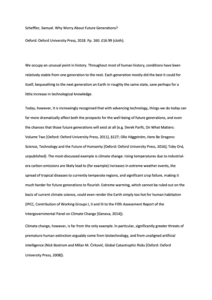Hilary Greaves: Book review of Scheffler's "Why worry about future generations?"
Other papers
Simulation expectation – Teruji Thomas (Global Priorities Institute, University of Oxford)
I present a new argument for the claim that I’m much more likely to be a person living in a computer simulation than a person living in the ground-level of reality. I consider whether this argument can be blocked by an externalist view of what my evidence supports, and I urge caution against the easy assumption that actually finding lots of simulations would increase the odds that I myself am in one.
Population ethical intuitions – Lucius Caviola (Harvard University) et al.
Is humanity’s existence worthwhile? If so, where should the human species be headed in the future? In part, the answers to these questions require us to morally evaluate the (potential) human population in terms of its size and aggregate welfare. This assessment lies at the heart of population ethics. Our investigation across nine experiments (N = 5776) aimed to answer three questions about how people aggregate welfare across individuals: (1) Do they weigh happiness and suffering symmetrically…
Against the singularity hypothesis – David Thorstad (Global Priorities Institute, University of Oxford)
The singularity hypothesis is a radical hypothesis about the future of artificial intelligence on which self-improving artificial agents will quickly become orders of magnitude more intelligent than the average human. Despite the ambitiousness of its claims, the singularity hypothesis has been defended at length by leading philosophers and artificial intelligence researchers. In this paper, I argue that the singularity hypothesis rests on scientifically implausible growth assumptions. …

